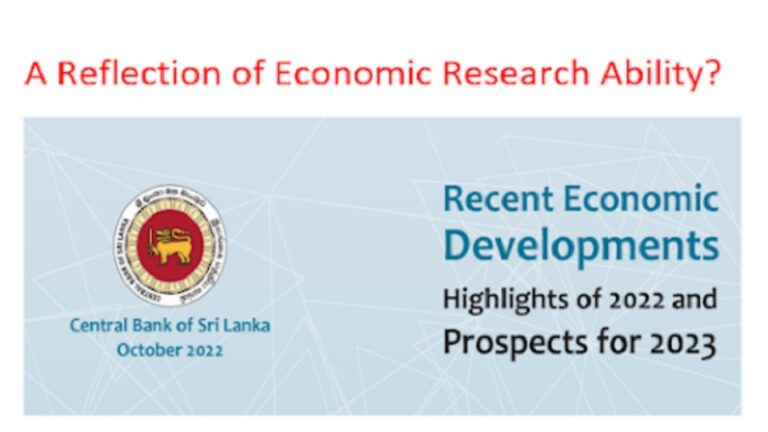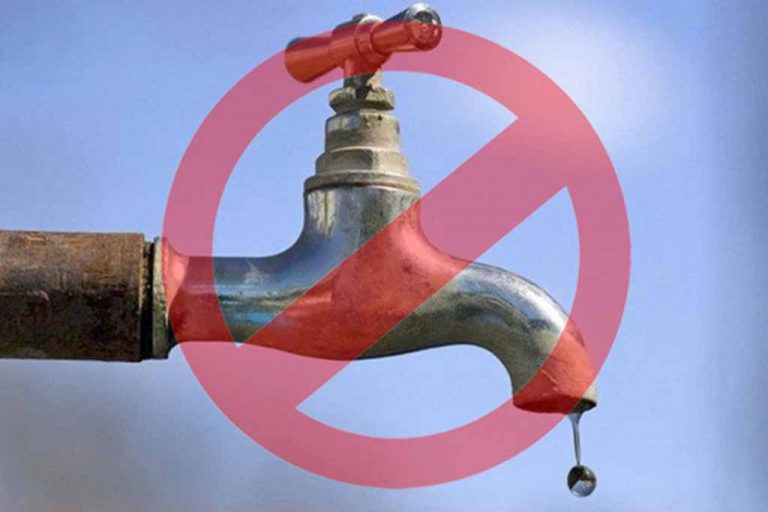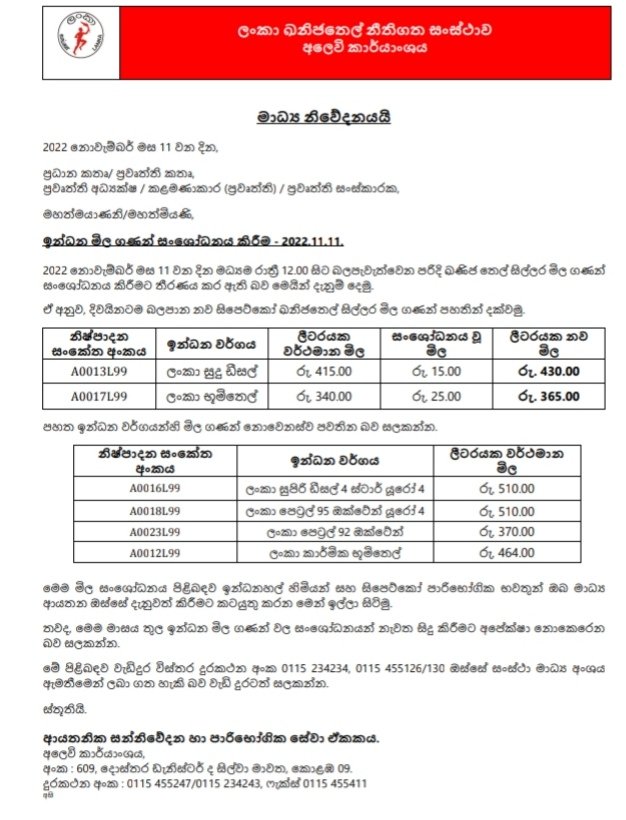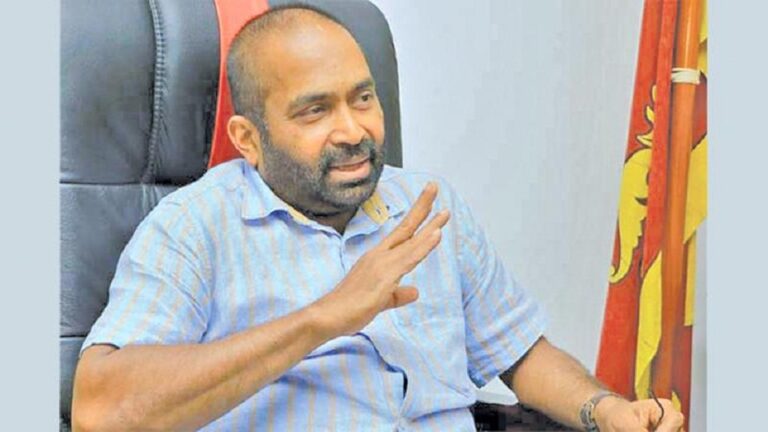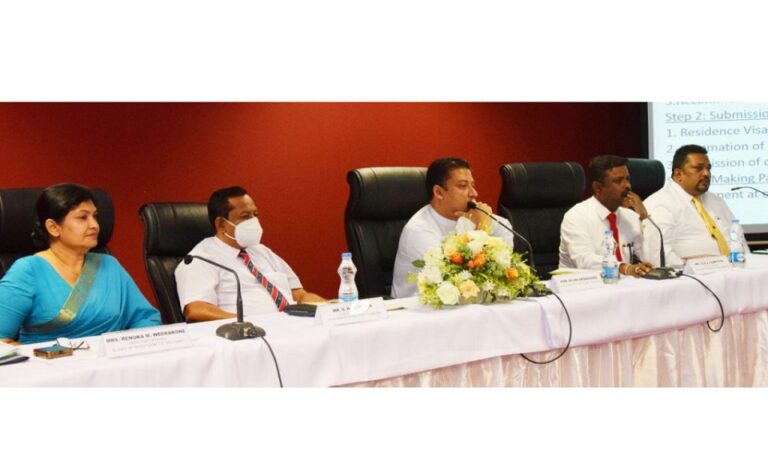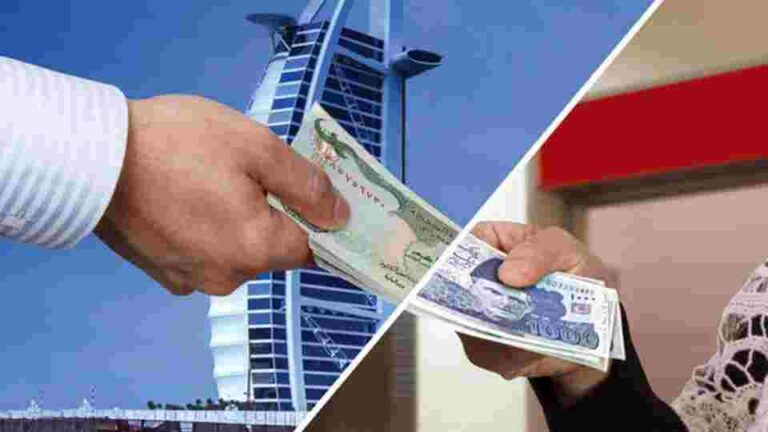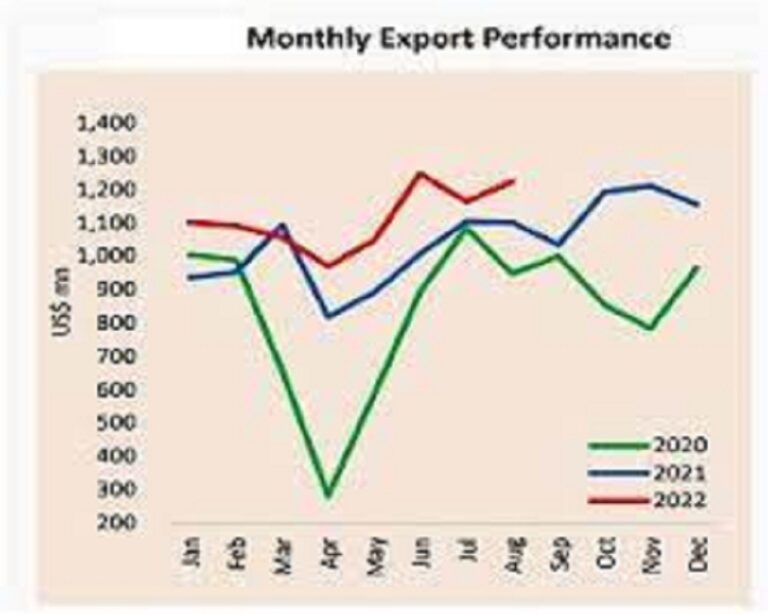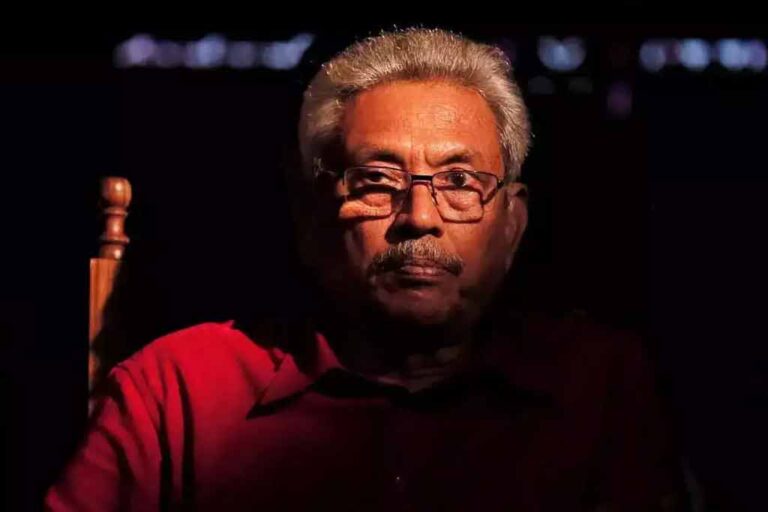Central Bank of Sri Lanka (CBSL) issued a press release on 9th November to inform the public of its latest publication “Recent Economic Developments.” The press release in its published format is given below at the end of this article.
Seeing the press release, I could not believe the pathetic situation that skills on research and publication at the CBSL have now reached after 72 years of its research operations.
Internal process of research findings and presentation in the CBSL
1. The general habit of the CBSL staff is to do research and present findings in a consistent and clear manner so that issues are rightly detected and implementable policy solutions are recommended. As all levels of supervisory layer up to the Governor are highly attentive and meticulous, the research staff irrespective of their language skills find painful and heartening times in getting their research reports cleared for submission to the next layer. Almost all reports go to the Governor who finally decides their fate. Getting a report cleared and accepted with marginal comments is a nightmare.
2. During the last two decades of my service in the CBSL, I painstakingly guided the staff to present their research findings in point form in maximum 2-4 pages with short paras and sentences under sub-headings supported by precise text tables along with detailed information given in the Annex for further reference. This is by no means an easy task unless relevant officials are fully conversant in both the subject under research and meaningful writing.
3. In instances of draft report owners not responding in an effective and prompt manner, I redrafted those in my computer to ensure timely and productive delivery of the underlying work to enable me to escape from allegation of the delay at my point. Further, comments made on margins of the reports caused hostile office environment. I overwhelmingly refused to sign reports for submission to the Governor or Monetary Board unless they are cleared by me well in advance.
4. The idea behind this approach of reporting is to ensure prompt implementation of correct public policies appropriate at particular times. As the CBSL is a public institution, implementation of any policy requires a research report with findings and recommendations specific to the subject/issue without any ambiguity submitted by the line staff because public decision-making by a single official on his hunch on the subject is not considered prudent and accountable in good public governance.
5. This is of utmost importance unlike in private affairs as public officials should stay prepared to establish the rationale and authority for public policies in documents in the event they are reviewed by Parliament or Audit or Judiciary. In certain instances, even series of even formally edited reports are produced for inquiry to frame various charges on fraud and irregularities against officials for personal revenge whereas some draft reports are leaked out to the media in order to create public issues despite the confidentiality of such documents. As such, drafting officers have a habit of keeping all drafts in the file for their safeguard in the event public issues are raised on the subject even when all have agreed. That is why some senior officials and even Monetary Board Members are now seen passing the blame to former Governors for ex-post issues raised on some policies. Therefore, the public accountability of all contents and words in research and policy reports is very high although the integrity of officials at different layers is difficult to be ensured.
6. Therefore, I used to advise all layers of officials that reports in fact were their public service products which would be of no use if they were not accepted by policy level officials. The main reason for the rejection of reports is the poor quality of findings and presentation, i.e., junk reports, not acceptable for policymaking, given immense risks confronted with public policymaking.
7. However, the attitude of most officials at research levels, especially of those who are conversant in managing the language, is that supervisory officials should accept whatever reports they submit at their convenience and, therefore, their duties are over as soon as the report is submitted. Therefore, reports are written for themselves and not for sale to their clients.
8. As staff performance assessment in public institutions is not easy, the authorities find extremely difficult to ensure the delivery of relevant public duties in a useful and timely manner. The present economic crisis is largely due to this kind of non-active work environment in public institutions.
9. The CBSL press release mentioned above along with many other press releases recently published invoked me to feel that CBSL research staff have gone back to their usual luxury of research and reporting, despite the existence of long supervisory layer from the Head of Department to the Governor. It appears that whatever reports coming from drafting researchers go unattended as they are.
10. This could well be the reason why the economy and general public have been compelled to confront the present economic crisis and bankruptcies due to the failure of the CBSL to implement policies of its mandate, primarily public debt, interest rates, foreign currency reserve and exchange rate as required in the Monetary Law Act.
Some comments on the CBSL press release
Therefore, I invite the readers to evaluate the research and policymaking ability of the present CBSL just from the quality of this press release. A few points are given below to help the readers.
- The whole press release is one paragraph of three pages containing a wide range of contents presented in long sentences plus one page of graphical presentation. Therefore, no reader will have any interest even to commence reading. Therefore, the objective of CBSL in publishing this press release is questionable.
- It appears that the writer has just copied the first three paragraphs and the graphical presentation given in the first four pages of the underlying Publication and pasted them in the press notice in the way he/she wished without any guidance by supervisory layer up to the Governor. The first paragraph in the Publication is also one and half pages long, all words in bold italic.
- The diversity of contents given in the paragraph is so vast that key findings of the research publication cannot be figured out. As the coverage of this publication is limited to highlights of economic developments of 2022 and prospects for 2023, it is not difficult to present key findings in less than 10 points.
- I am not sure any reader will understand the research findings depicted in the graphical presentation other than enjoying the artistic value.
- Any report on economic developments should be presented in three major areas, i.e., key outcomes of economic activities, underlying reasons and supporting policy actions, irrespective of the target group. Its purpose should be to educate the public on the reality of the economy and to stimulate them to deliver their part as the economy is a result of acts of the general public and not of the CBSL or the government. However, even professional economists will not benefit from this other than picking of recent economic numbers. Further, the public have a very good underdoing of recent economic developments through their struggle for living and, therefore, the CBSL may not be able to make the public believe of artificial findings as usual, other than the political leadership looking for rosy stories.
- I paste below first four sentences of the press release (and the Publication) and invite the readers to try to understand them.
The Sri Lankan economy, which faced extreme headwinds and heightened uncertainties during the first half of 2022, has shown signs of stability in the second half of the year thus far, helped by the myriad of multifaceted policy interventions undertaken to steer the economy to transition towards a path of stable and sustainable growth over the medium term. Although the economy was on a recovery path subsequent to the abating of the COVID-19 pandemic, its progress was muted by the culmination of the entrenched twin deficits in the government budget and external current account. Hence, the growth momentum observed towards the end of 2021 dissipated rapidly and the real economy fell into a contraction during the first half of 2022, driven by the spillover effects of the unprecedented economic crisis felt across several sectors, owing to fuel shortages, power outages, widespread scarcity of key imported raw materials and other essentials, and the soaring cost of production, among other factors. The steady rise in inflation to historically high levels since the beginning of the year has hollowed out household purchasing power.
I just wish to comment on words “shown signs of stability in the second half of the year thus far…”
- This is technically incorrect as signs of stability cannot be expected until the economy recovers back to pre-crisis living standards and then prevails around or grows from that level. Therefore, stability does not mean the stay of the bankrupt/collapsed economy from further bankruptcy.
- However, the stability duties mandated to the CBSL are economic and price stability and financial system stability with a view to encouraging and promoting the development of productive resources of Sri Lanka. Therefore, it is unlawful for the CBSL to comment on signs of any other kind of stability it prefers.
- Everybody knows that the CBSL has lost its stability mandate as people just struggle to live through the economic crisis without any signs of getting it eased and without any convincing policy programme other than expectations on complicated IMF loan and external debt restructuring.
Final Comment
The press release as well as the Publication expose the CBSL to huge public accountability risks due to the poor clarity and diverse interpretability of the contents. The willful attempt to mislead the public on the present economic crisis, outcomes and policy actions will be a serious concern that can be challenged for judicial review of the public accountability of the relevant CBSL officials who drafted and approved these contents.

P Samarasiri
Former Deputy Governor, Central Bank of Sri Lanka
(Former Director of Bank Supervision, Assistant Governor, Secretary to the Monetary Board and Compliance Officer of the Central Bank, Former Chairman of the Sri Lanka Accounting and Auditing Standards Board and Credit Information Bureau, Former Chairman and Vice Chairman of the Institute of Bankers of Sri Lanka, Former Member of the Securities and Exchange Commission and Insurance Regulatory Commission and the Author of 10 Economics and Banking Books and a large number of articles publish.
The author holds BA Hons in Economics from University of Colombo, MA in Economics from University of Kansas, USA, and international training exposures in economic management and financial system regulation)
CBSL Press Release

The Sri Lankan economy, which faced extreme headwinds and heightened uncertainties during the first half of 2022, has shown signs of stability in the second half of the year thus far, helped by the myriad of multifaceted policy interventions undertaken to steer the economy to transition towards a path of stable and sustainable growth over the medium term. Although the economy was on a recovery path subsequent to the abating of the COVID-19 pandemic, its progress was muted by the culmination of the entrenched twin deficits in the government budget and external current account. Hence, the growth momentum observed towards the end of 2021 dissipated rapidly and the real economy fell into a contraction during the first half of 2022, driven by the spillover effects of the unprecedented economic crisis felt across several sectors, owing to fuel shortages, power outages, widespread scarcity of key imported raw materials and other essentials, and the soaring cost of production, among other factors. The steady rise in inflation to historically high levels since the beginning of the year has hollowed out household purchasing power. This anomalous rise in inflation stemmed from domestic and global supply side disruptions, the undertaking of long overdue adjustments in administrative prices, the sharp depreciation of the Sri Lanka rupee against the USD, and the release of pentup demand pressures emanating from the lagged impact of monetary accommodation in the recent past. Moreover, the expansionary fiscal policy with the low tax regime introduced in late 2019 fuelled inflation, not only by directly enhancing aggregate demand but also by necessitating monetary financing to bridge the expanding budget deficit amidst the lack of access to international capital markets following the rating downgrades. The monetary tightening efforts, which commenced in August 2021, accelerated thus far in 2022 to avoid possible de-anchoring of inflationary expectations and arrest lingering demand driven pressures. Supported by these measures and the easing of supply side pressures, inflation commenced moderating along the envisaged disinflation path in October 2022. Meanwhile, the passthrough of monetary tightening measures coupled with persistently tight money market liquidity conditions led to sharp upward adjustments in market interest rates resulting in a substantial decline in private sector credit. Nevertheless, net credit to the Government by the banking system expanded notably amidst low government revenue and limited access to foreign financing sources. The growth of broad money supply (M2b), once adjusted for the impact of the depreciation of the rupee, has registered a deceleration from its peak in April 2022 driven mainly by the contraction in private sector credit and the decline in net foreign assets of the banking system. During the year, servicing of external debt became increasingly challenging, given the lack of access to international markets due to consecutive sovereign downgrades and the bunching of large foreign debt service payments amidst lacklustre foreign exchange inflows. With due consideration to these challenging circumstances, the Government announced a standstill on external debt servicing on account of bilateral and commercial loans for an interim period commencing from 12 April 2022. In the period thereafter, with the intention of helping the economy to transit to a stable and more sustainable footing, the Government embarked on a reform programme through the introduction of a slew of measures to increase both tax and non-tax revenue, while continuing its drive to further rationalise expenditure through the curtailment of non-urgent capital expenditure and recurrent expenditure. Further the Government opted to seek financial assistance from the IMF by way of an EFF arrangement. However, the overstretched fiscal position, which is already weighed down by soaring levels of debt, offered little fiscal leeway to undertake measures that could catalyse the economic recovery process. The external sector also continued to grapple with heightened challenges amidst the dearth of liquidity in the domestic foreign exchange market. Despite the subduing of import demand and the announcement of the debt standstill, modest inflows to the current and financial accounts were insufficient to tame pressures on the exchange rate. The external current account deficit widened in the first half of 2022, compared to the same period in 2021. The trade deficit narrowed due to the moderation in imports driven mainly by import control measures, lack of availability of foreign exchange in the market, depreciation of the exchange rate, tighter monetary conditions and the robust export performance. Tourism earnings recorded some turnaround, while workers’ remittances remained subdued despite recording some revival in recent months. The heightened pressures on the exchange rate necessitated a measured adjustment, which was allowed on 07 March 2022. However, the sparse liquidity conditions in the domestic foreign exchange market and adverse market perceptions caused a sharper than expected depreciation of the exchange rate. With a view to curtailing excessive and speculative volatilities in the intraday exchange rate, the Central Bank commenced providing guidance to the market by announcing a middle rate and a variation margin of the interbank weighted average spot exchange rate from 13 May 2022. This enabled restoring stability in the exchange rate to a greater extent and minimising the gap between official and grey market exchange 3 rates. The engagement with the IMF on a macroeconomic adjustment programme progressed on many fronts, with a staff level agreement for an EFF being reached in early September 2022. The debt restructuring process has also reached an advanced stage. The economic issues in Sri Lanka are encapsulated in deeply entrenched structural weaknesses that are a culmination of the lack of policymakers’ commitment to undertaking holistic and efficacious reforms over the long run. The IMFEFF programme will provide an opportunity to embark on much needed and long neglected structural adjustments in a more structured and timely manner, which will be instrumental in shaping the economy to progress on a trajectory of greater stability and sustained growth. Nevertheless, the expected near term recovery of the economy is fraught with many challenges due to the unprecedented scale of the crisis that the economy is facing and uncertainties on several fronts which may require swift policy actions as circumstances evolve. In the midst of significant economic challenges on the domestic front, the economy will also have to grapple with global uncertainties emanating from monetary policy tightening measures adopted by major central banks in response to surging inflation, the spillover effects of geopolitical tensions and thereby a looming global recession, which will make the external environment less conducive for economic recovery. Considering the progress that has been made thus far in relation to the IMF-EFF programme and debt restructuring negotiations, and the reforms that have already been undertaken and those that are to be implemented in the period ahead, the economy is expected to transition onto the path to recovery from the latter part of 2023. Nevertheless, this will hinge on policymakers’ unwavering commitment to implementing policy reforms in a timely, holistic, and efficacious manner while ensuring that such commitment remains unhampered by political and election cycles. This is imperative to prevent any oscillations of national policies in the crucial period ahead in order to strengthen the economy’s resilience to external shocks, thereby ensuring its unwavering progress over the medium term.


